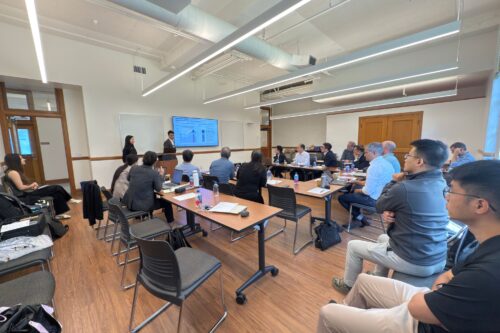
E3’s Manfei Wu and Adrian Au participated in a panel hosted at UC Berkeley in partnership with Energy Innovation, meeting with a delegation of Chinese energy leaders to discuss long duration energy storage (LDES) and system planning in high-renewables grids. The session was part of a study tour organized under a project of China Council for International Cooperation on Environment and Development (CCICED), a high-level advisory body that includes policymakers, researchers, and academics. Attendees included representatives from the State Grid Corporation of China (the largest utility company in the world), the State Grid Energy Research Institute, and Zhejiang University.
The delegation came to California to learn about U.S. planning approaches, particularly how systems like CAISO are adapting to high levels of renewables and storage. Manfei and Adrian shared insights from E3’s recent work to ground the conversation. For example, for a project in California, E3 explored how long duration storage can potentially support grid reliability, reduce overbuild, and improve system flexibility as the state pursues its SB 100 goals and beyond. That report is available here. In Massachusetts, E3 analyzed how mid- and long-duration storage could contribute to resource adequacy and capacity value as offshore wind grows across the ISO-NE footprint. Find that study here. While the policy and market environments differ, both studies offered insights on the roles and potential values LDES could bring to high renewable penetrated systems in the long term.

For the Chinese delegation, where coal still plays a dominant role and the power system is more centralized, many of the underlying questions were familiar, but the planning frameworks are very different. China has set aggressive decarbonization goals and is exploring market reforms to enable more competition and better integrate new technologies. The conversation highlighted how California and Massachusetts’ experience can offer practical lessons on the operational realities of high-renewables systems: key challenges and risks for systems with high renewable penetration, and how short- and long-duration storage can be leveraged to support system reliability and enable more economical replacement of fossil fuel resources.
Adrian and Manfei shared how LDES can play a range of roles in a deeply decarbonized grid, including reducing renewable curtailment, maintaining reliability during multi-day lulls in solar and wind, and lowering overall system buildout by smoothing year-to-year variability. They outlined how different durations of storage (from 12 to 100+ hours) contribute to capacity value, and how emerging technologies will need to meet certain cost and performance thresholds to be competitive in future portfolios. One key takeaway: while shorter-duration storage dominates day-to-day balancing, long duration storage becomes especially valuable for rare but critical periods of system stress, such as cold, low-renewable winter weeks.
“It was interesting to hear about the different planning schemes across the two countries and to discuss the common lessons that could be shared,” said Manfei. “As someone from China, it’s exciting to see their commitments and continued efforts to modernize the grid and push for decarbonization, and I’m glad we could help support that effort with perspectives from our work.”
For E3, the event was a reminder of the value of technical dialogue across borders. As utilities and governments around the world plan for more variable supply, changing loads, and emerging technologies, forums like this help build shared understanding and a clearer path to reliable, high-renewables systems.


